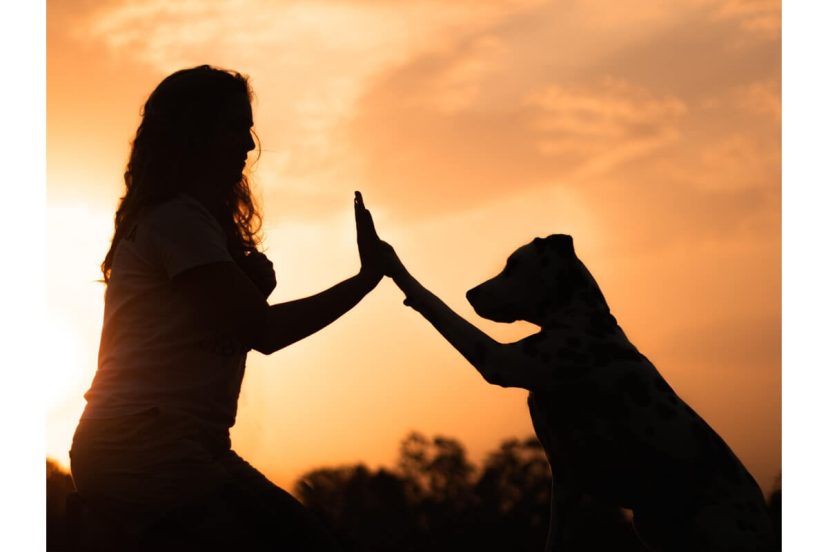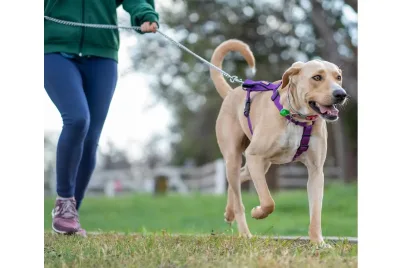Trained Dog: Mastering Pet Parent Skills
In my capacity as a fervent supporter and committed caregiver to my canine companion, I understand the joys and hurdles of nurturing a trained dog, who is your furry friend. Witnessing your pet’s growth is fulfilling. Effective training is key to a harmonious relationship.
Nurturing a trained dog isn’t all about tricks; it’s about building trust and communication. Connecting with your dog on a deeper level. Being a devoted dog parent, I’ve experienced its importance firsthand.
Let’s delve into the significance of a trained dog, as well as why and how dog parents can enhance their skills. February marks National Dog Training Education Month, a great reason to explore a trained dog.
Dog Training Education Month
Dog Training Education Month urges pet parents to nurture well-behaved canines. While it’s ideal to instill good habits early, it’s never too late to refine behavior. Yes, you can teach an old dog new tricks 😉
The importance of responsible pet ownership and fostering strong human-canine bonds is the focus of Dog Training and Education Month. Training isn’t just about obedience; it’s about creating happier pets and owners alike. A trained dog not only enriches our lives but also contributes to safer communities and environments.
Training your dog not only ensures their safety but also that of your loved ones and belongings. Moreover, it strengthens the special bond you share with your furry friend. Beyond obedience, training stimulates your dog’s mind and fosters trust, allowing for enjoyable activities together. With a trained dog, you can confidently engage in various adventures, knowing your pup will behave appropriately, enhancing both your experiences and your dog’s overall well-being. The benefits extend beyond just physical safety, encompassing emotional fulfillment and harmonious relationships for both you and your doggie.
Building a Strong Bond with Your Dog
Establishing trust and mutual respect is essential in building a strong bond between pet parent and dog. By earning your dog’s trust and respect through positive interactions and consistent training, you lay the groundwork for a harmonious and cooperative partnership. A relationship built on mutual trust and respect fosters open communication, cooperation, and mutual understanding. This trust and respect empower dog parents to effectively guide and influence their dogs’ behavior while nurturing a positive and rewarding relationship.
6 Pet Parent Skills for a Trained Dog
At the heart of a trained dog lies a set of essential qualities that a pet parent should possess, as these are instrumental in shaping a dog’s behavior and facilitating effective learning.
-
Patience
Patience is perhaps the most critical quality, as training can be a slow and repetitive process. Dogs, like humans, have their own pace of learning, and it’s essential to remain patient and understanding throughout the training process. Whether it’s mastering a new command or overcoming a behavioral issue, patience is key to building a trusting relationship with your dog.
-
Consistency
Consistency is crucial in reinforcing desired behaviors and shaping your dog’s responses to commands. By consistently applying training techniques and expectations, you establish clear boundaries and expectations for your dog, leading to more successful outcomes in training. Dogs thrive on routine and repetition, a core tenant of consistency.
-
Empathy
Empathy allows you to understand and connect with your dog on a deeper level. By empathizing with your dog’s perspective and emotions, you can tailor your training approach to meet their individual needs and preferences, fostering a positive and supportive learning environment.
-
Effective Communication Skills
Effective communication is essential in conveying instructions and expectations to your dog during training sessions. Clear and concise commands help your dog understand what is expected of them and reduce confusion. Using simple language and consistent cues, you can effectively communicate your intentions to your dog and facilitate learning.
-
Adaptability
Adaptability and flexibility allow for the adjustment of techniques to suit the needs and learning styles based on individual dogs’ needs and responses. Being open to new approaches and willing to experiment with different methods allows you to find what works best for your dog, maximizing the effectiveness of your efforts. Adjusting techniques for different situations ensures that training remains dynamic and responsive to the ever-changing needs of both you and your dog.
-
Being Observant
By observing subtle cues and signals, pet parents can anticipate and address potential challenges during training sessions. Understanding breed-specific traits and instincts allows you to tailor your approach to suit the needs and preferences of your dog, maximizing the effectiveness of your efforts. This is essential for understanding underlying motivations and addressing behavioral issues effectively.
Mastering these pet parent skills is crucial for nurturing a trained dog. Patience, consistency, empathy, and effective communication are paramount. Being adaptable and observant allows for dynamic training sessions tailored to individual dog needs. Understanding your dog fosters a strong bond. By embodying these qualities, pet parents can create a supportive environment conducive to successful training outcomes. Training becomes a fulfilling journey.
Ultimately, the bond forged through training enhances both the pet parent’s and the dog’s quality of life, creating a harmonious relationship. Use these skills to support your dog’s learning process and set you both up for success.
The Importance of a Trained Dog
Having a trained dog goes beyond teaching them basic commands; it’s about building a strong bond and ensuring their safety. A trained dog is not only a joy to be around but also less likely to engage in destructive behaviors or pose a risk to themselves and others. Training plays a crucial role in shaping your dog’s behavior and enhancing their overall well-being.
Socialization
Exposing your dog to various environments, people, and animals is essential for their socialization and development. By introducing your dog to new experiences in a positive and controlled manner, you can help them become confident, well-adjusted companions. Socialization also plays a crucial role in preventing fear-based behaviors and aggression towards others.
Positive Reinforcement
Positive reinforcement is a cornerstone of a trained dog, as it encourages desired behaviors through rewards and praise. By rewarding your dog for exhibiting desired behaviors, dog parents can reinforce those behaviors and strengthen the bond between them. Positive reinforcement builds trust and confidence in dogs, making them more receptive to learning and eager to please. It fosters a positive training environment where dogs feel motivated and engaged, leading to faster and more enduring results.
Maintaining Training
Consistency is key to maintaining your dog’s training over time. Regular practice sessions and incorporating training into your daily routines will help reinforce learned behaviors and prevent regression. Remember, training is an ongoing process and requires continued practice and reinforcement for a trained dog.
Training is not limited to formal sessions; it’s ongoing and should occur throughout the day in various contexts. By incorporating training into daily routines and activities, dog parents can reinforce desired behaviors and provide opportunities for learning and growth. Consistency plays a vital role in preserving progress and ensuring that training remains a fulfilling experience for both of you.
The Role of a Trained Dog Parent
Being a trained dog parent goes beyond teaching commands; it’s about providing love, care, and guidance to your furry companion. As a responsible pet parent, it’s your responsibility to ensure your dog’s physical and emotional needs are met, including regular exercise, proper nutrition, and veterinary care. By investing in your dog’s training and well-being, you can create a strong and lasting bond that enriches both of your lives.
Celebrating Success
As you progress on your training journey with your dog, don’t forget to celebrate the milestones along the way. Whether it’s mastering a new command or overcoming a behavioral challenge, every achievement is worth celebrating. Take pride in your dog’s progress and enjoy the many benefits of having a trained dog and well-behaved companion by your side.
Conclusion
Mastering pet parent skills is pivotal for fostering a trained dog and nurturing a strong bond. Patience, consistency, empathy, effective communication, adaptability, and observance are essential qualities. These attributes contribute to a supportive environment conducive to successful training outcomes. Ultimately, the bond forged through training enhances both the pet parent’s and the dog’s quality of life, creating a harmonious relationship. Utilize these skills to support your dog’s learning process and set you both up for success.
FAQs:
Q1. What is the significance of Dog Training Education Month?
A: Dog Training Education Month highlights the importance of nurturing well-behaved canines and fostering strong human-canine bonds.
Q2. Why is consistency crucial for a trained dog?
A: Consistency reinforces desired behaviors, establishes clear boundaries, and fosters successful outcomes in training sessions.
Q3.: How can I celebrate milestones in my dog’s training journey?
A: Celebrate achievements, such as mastering commands or overcoming challenges, to reinforce positive behavior and strengthen your bond by showering your dog with praise, a new toy or a special treat.
Q4.: What role does socialization play in a trained dog?
A: Socialization exposes dogs to various experiences, aiding in their confidence and preventing fear-based behaviors or aggression.
Q5.: Why is positive reinforcement important for a trained dog?
A: Positive reinforcement builds trust, confidence, and motivation in dogs, making them more receptive to learning and eager to please.ar




